The Weekly Watch
Alternatives?
Have you watched the new film "Planet of the Humans"? It takes on corporate large scale alternative energy, and presents it in a negative light. Many prominent environmentalist are responding in a hair on fire manner. The film makers discussed the criticism on The Rising this week. I think the film makes important points like chipping up forests for electrical production is NOT 'green' energy, several large scale expensive alternate faculties are in disrepair or totally off line, and that we must deal with the root cause of environmental destruction, over population and over consumption. However, the film never visits small, local, home scale alternate energy systems. So I thought it might be fun to do so in today's column.

Today let's look at three types of communities that commonly create their own power. There's a community of people who live in their vans, bus conversions, and camping rigs; Also the sailing community, who need to be able to be self contained at sea; And the homesteading and tiny house crowd which often produces their own power. It isn't just alternate power these communities have in common, but alternate life style as well. Now this is not to suggest that these folks use no fossil fuels (the ultimate goal) cause they drive, motor into harbors, and put fuel in tractors and such. However they are successful at producing much of their own power.
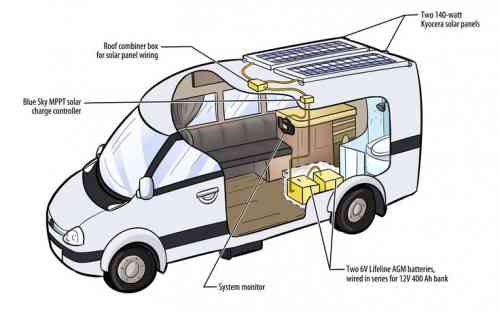
Van life
This is a community which often goes to remote places like BLM properties and sets up sometimes for months. Many travel around the world even shipping their vans across oceans. Some make the epic trip from Alaska to Chile. Several were caught in Central and South America in the pandemic lockdown. Here's a nice introduction to many of these van dwellers (rather than their vans) talking about their lockdown experience. 40 mins with several folks...
The creativity and variety of rig designs of this community is fun to observe. Here's one of my favorite rigs https://www.youtube.com/watch?v=9LS3BBdvnw8 (13 min)
They use solar and diesel fuel.
There are several van life channels. Almost all the folks in the first clip have one. This fellow provides lots of useful information rather than the travelogue approach of most of them. https://www.youtube.com/channel/UCAj7O3LCDbkIR54hAn6Zz7A/videos
He had an hour live stream to deal with others questions about solar systems and van life.
https://www.youtube.com/watch?v=vNtZS_8KZBg
He often reviews and compares various systems. Here he looks at a vehicle rooftop unit.
https://www.youtube.com/watch?v=cXgVSs6FBgc (10 min)
And one more...Meet Jim Who Lives off-Grid with 1185 Watts of Solar
https://www.youtube.com/watch?v=cCZVAX-c4co (15 min)
EASY OFF-GRID SOLAR INSTALL in a VAN
https://www.youtube.com/watch?v=NSzyAjlxIvI (17.5 min)
Here's the components we use for our solar, as well as the generator we carry so we can run anything in our camper anytime we like. The key is having the generator in a spot where you essentially forget about it until you want it.
https://www.youtube.com/watch?v=zo2W8ckHeNI (24 min)
In this video I’ll show you how I built a portable off-grid solar generator with higher capacity than commercial units at a fraction of the cost. I’ve posted the parts list, wiring diagram, and engineering worksheet so you can tailor your own solar generator to your exact needs.
https://www.youtube.com/watch?v=QZYAAatdlmc&t=2m (14 min)
It is fun to get to know the youtubers living the nomad way of life.
Here's one couple's situation during the pandemic
After spending over a week parked down by the river, we were out of water, our wifi device stopped working, and we had received an extremely kind invitation from one of our subscribers... from one of you!
https://www.youtube.com/watch?v=l_C46r3fKSg (22 min)
There are a few attempts at creating solar powered vans, using the sun to drive their vans.
https://www.youtube.com/watch?v=pcj2lQwH7N4 (8.5 min)
Here's '73 solar electric VW van.
https://www.youtube.com/watch?v=fGZ1zbqAGA0 (9 min)
So solar is the big winner for boondockers, overlanders, and van dwellers.
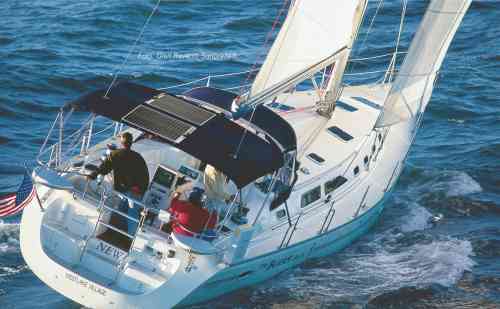
Sailing on a summer breeze...skipping over the ocean...
The sailing community also has several youtubers. It is a way to help fund their travels. I caught a clip describing cruising costs over the year, and it comes in at about $20,000 USD. Solar is also a natural fit for sailboats. Some also include wind generation and a few even have a turbine under the boat. I like the freedom and sense of adventure expressed by these sailors.
Brian and Karin Trautman have been living on a sailboat for 10 years, and their boat is set up so they can be off the grid in remote places for months at a time with solar and wind power providing electricity, a water maker that turns salt water into fresh water, multiple freezers and loads of storage space for food, and even a small washing machine on board!
https://www.youtube.com/watch?v=lk83N2u1ZmY (28 min)
Here's the same family.
In a previous episode we removed a solar panel to install our new Viasat Internet, so to replace the lost capacity we decided to work with https://sunpoweredyachts.com to install 780W of flexible solar panels on Delos.
https://www.youtube.com/watch?v=wTa6HEo2_K8 (22 min)
Living on an off grid sailboat
we explain the off grid systems and components of our Allied Seawind 30 sailboat. We dive into sun and heat protection, fresh water storage, rain collection, showering, food storage, cooking, and our galley setup, our wind and solar array as well as our diesel engine, and finally how we stay connected while off grid.
https://www.youtube.com/watch?v=hRHskbdRFFs (30 min)
This Lagoon 47 Catamaran is a prototype diesel-electric hybrid built in 1996. It's pretty cool to see that Lagoon was experimenting with electric propulsion over twenty years ago. It's also neat to see the system is still functioning today and is sailed on a regular basis. Join us for a full walk through of this very unique yacht.
https://www.youtube.com/watch?v=v2ZRfF2-qlE (13 min)
Energy independence on a sailboat can be simple or more complex depending on the system
https://www.youtube.com/watch?v=5JOIpIl-d7k (12 min)
Short version about 2 min - hang in there through the new batteries to hear the real costs.
https://www.youtube.com/watch?v=izMqIfbj3_A&t=10m
Find out why we chose SAILING. Why we live off grid on a sailboat.
We have had the pull of the ocean for a while. The idea of being able to live off grid on our sailboat. Raising the sails, feeling the wind on your face, while your mind is free. Sailing, it's a big decision but an environmentally small impact. Living on a sailboat is self sufficiency at its finest.
https://www.youtube.com/watch?v=d7FuSSm140g (10 min)
Here's a a family of six living off grid on a sailboat
https://www.youtube.com/watch?v=Detyb1pSoKo (20 min)
There also the boat that transported Greta across the Atlantic in two weeks. (2 min)
This is a racing boat designed for speed rather than comfort. The Malizia II is an 18 metre (60ft) racing yacht that was built for round-the-world challenges and has just completed the Fastnet race, which runs every two years. While the wind propels it, the vessel generates the power for lighting and communication through solar panels and underwater turbines. The racing team have removed sponsorship logos from the hull and emblazoned Greta’s slogan “Unite Behind the Science” on the mainsail. The yacht is designed for speed rather than luxury so conditions will range from basic to difficult. There is no toilet or shower on the boat, only blue plastic buckets.
On the other extreme here's a $1.5 million solar powered boat using electric bus motors (and also a diesel generator)
https://www.youtube.com/watch?v=nVG5SMwxLYY (13 min)
To my way of thinking it seems like this is on the over-consumption end of the spectrum.
Growing a better future at home.
Most homes don't move like boats and vans (except for some tiny houses on trailers), so alternate power is a different ballgame. Simply utilizing the site and positioning a house correctly you can gain a good bit of passive energy. In my youth I read David Wright's "Passive Primer" where I took away the idea that a house should be like a thermos pointed to the south (for Janis in NZ that's north). In the winter you open it during the day to collect heat and close it at night to conserve what you've collected. In summer, it is just the opposite. Close it from the sun during the day and open it up to lose heat at night.
I've featured Earthships several times. From my view these homes are low input using recycled materials, and super efficient collecting and holding heat.
https://www.youtube.com/watch?v=oTU2KlwOnQw (9 min)
These are amazing passive structures.
Homesteads and tiny houses offer many alternate energy options. In addition to solar and wind, there's hydro, biogas (methane), geothermal, and simple passive design to take advantage of seasonal changes. Here's a nice collage of approaches. Tips from off grid tiny homes. 19 min
When people hear geothermal they often think large infrastructure as in Iceland's system, but simply berming or sinking a home in the Earth maintains temperature. Here's a fellow growing oranges in Nebraska with Earth tubes providing heat.
https://www.youtube.com/watch?v=ZD_3_gsgsnk (18 min)
Every site is unique and some have resources that others lack. Some have the good fortune to have running water as a potential energy source. More small home sized systems designed for lower flows are being developed.
https://www.youtube.com/watch?v=1KyL1-0A0Gw (7 min)
https://www.youtube.com/watch?v=XjEgFlngZ04 (5 min)
Here's an off grid cabin with electricity provided by a hydrosystem
https://www.youtube.com/watch?v=2scoi0Gqxko (14 min)
And one more just for fun
https://www.youtube.com/watch?v=37HIZFOE4_Y (5 min)
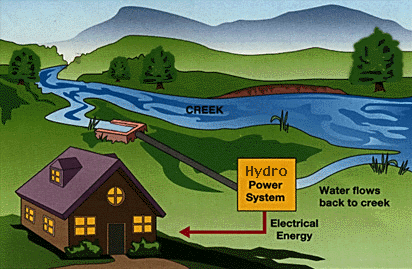

Using your organic waste, you can make your own natural gas, methane. You can build a digester or purchase one ready to use.
Here's one method or design https://www.youtube.com/watch?v=Cwm5Rm8uIsk (8.5 min)
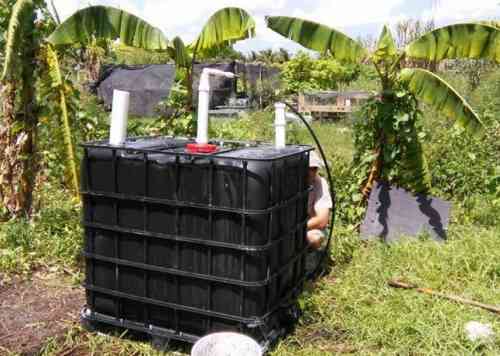
And here's many other designs ...methane production
simple demo https://www.re-energy.ca/docs/biogas-generator-cp.pdf
https://small-farm-permaculture-and-sustainable-living.com/methane_gener...
There are a few small/home sized units commercially available
https://www.homebiogas.com/Products/HomeBiogas2
These units can also include a toilet feed.
https://www.homebiogas.com/Products/HomeBiogas_Toilet
A gas I'll just mention is hydrogen, easily made by using a solar PV panel and splitting water into H and O. For the most part, this is still in the potential phase probably by design (see the clip below to see the possibility).
The promise of hydrogen ...
https://spectrum.ieee.org/energywise/green-tech/fuel-cells/solar-panel-p...
However, there are people making and using hydrogen to power their homes and cars.
In 2006, Mike took his home off of the electrical power grid. Ever since, he has been generating his own electricity. All of Mike's electrical power comes from solar energy. He usually generates 160 percent more energy than he needs to power his home. Mike isn't likely to sell his power to the grid. Instead, Mike uses the excess electrical power to make hydrogen, which he stores in tanks, to run his car on. Mike has proven that it is possible for you to power your home and car from solar power.
This is one of the most interesting integrated alternate power systems I've seen. (7 min)
On a van, boat, or house, PV (photovoltaic) power is essentially the same. Some panels have greater efficiency (and typically costs) than others. The big cost and input are batteries. These can be super expensive like a Tesla power wall or fairly inexpensive like golf cart batteries. Some power companies offer a tie in to the commercial grid allowing you to sell your excess production to them and therefore escaping the costs of batteries all together.
So here's a simple system set up similar to one that might be used in a van ...
Installing a Basic 12V Solar System in an Off Grid Cabin
Lighting and fans are powered by the system, and charge stations are installed to charge small devices like phones and tablets. This system is not intended for powering large, high amp drawing appliances.
https://www.youtube.com/watch?v=3R16D1eZWdQ (6 min)
The sun's thermal energy can also be easily used especially for hot water. Our solar hot water system uses an antifreeze liquid to circulate through tubing inside a 250 gallon tank. It supplements our propane hot water heater to provide heat in winter with a radiant floor system. The commercial units (we have three panels) and tank were expensive, but we've been making our own hot water for over a decade now.
https://news.energysage.com/pros-and-cons-of-solar-hot-water/
There are simple homemade units that would work very well in the summer. Here's an inexpensive, DIY model. https://www.youtube.com/watch?v=Sc78nueDQ64 (8 min)
Solar ovens are another thermal collection option. There are commercial units and simple DYI models. Some units are built in and accessible from the kitchen of the house. Here's some tips about cooking in solar ovens.
Wind power is something I've had no experience with, so all I can do is link some sources of information.
https://www.renewableresourcescoalition.org/best-home-wind-turbines/
https://www.energy.gov/energysaver/installing-and-maintaining-small-wind...
https://www.energy.gov/energysaver/save-electricity-and-fuel/buying-and-...
Perhaps some of you have had experience and can share your opinion of wind generated electricity.
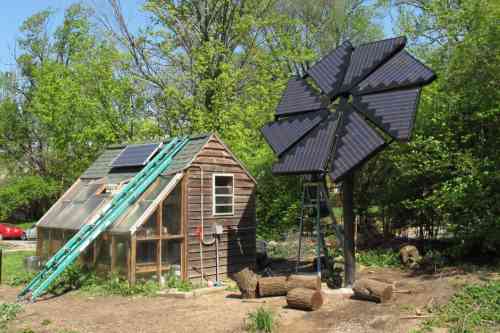
We can't leave out perhaps the easiest alternative power conservation trick...
growing a garden! Plants are the ultimate solar collectors.
I'm concerned about the food supply system, so I encourage you to plant some food crops...at least lettuce, beans, and tomatoes.
Probably the most important measure that we propose is to move food production away from the fragile, corporate-controlled globalized food supply chain based on narrow considerations such as the reduction of unit cost to more sustainable smallholder-based localized systems.
https://www.counterpunch.org/2020/04/28/the-corporate-food-system-is-mak...
...and of course they are not targeting help to farmers providing local produce.
...when the USDA finally announced how it planned to allocate the $9.5 billion from the CARES Act, it appeared that no money would be reserved specifically for small farmers.
https://theintercept.com/2020/04/29/small-farms-coronavirus-aid/
I often hear folks say, well it is just too expensive to homestead. I challenge that concept because if you want to make it happen, you can. We managed to purchase our property and create our homestead while we both taught. We didn't have children and that does make money easier to manage, but my point is we didn't have much money at the start of this 30 + year homestead journey.
Consider the following offer...
Do you know a young couple wants to "get back to the land"? Well here's the opportunity of a lifetime for someone who wants to homestead on the left coast...
In 1968, Charles Bello and his wife, Vanna Rae, moved onto 240 acres of redwood forest looking to live a simpler life off the land. They had spent their savings to purchase the land so they got to work building their home themselves.
Now, 87 years old and a widower, Charles is determined to find successors; he hopes to find three couples who want to settle on the property (currently worth about 4-6 million dollars) in exchange for continuing as stewards of the land. He is currently building glamping guest houses that he hopes will help fund the enterprise. His website now advertises “seeking caretaker ASAP”, someone “wanting to get away from it all and live a more simple down to earth lifestyle”. http://savetrees.org/seeking_caretaker.aspx
https://www.youtube.com/watch?v=2qcsWajivnI (45 min)
What a beautiful homestead they created. We are in a similar situation with no kids to leave our place. We've been shopping for the right couple to gift our place when the time comes.
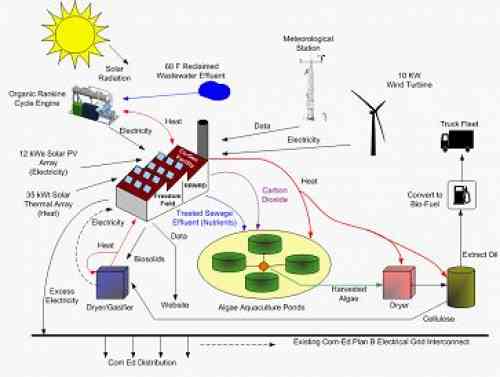
So I think there are many economical, sensible, alternate energy options. My take away is small scale integrated systems can provide much if not all our power needs. The "Planet of the Humans" raises many legitimate concerns. Josh Fox was on Rising leveling criticism at the film without admitting the real issues they bring to the table. For example if you think deforesting to provide chips for power production is "green" you're not much of an environmentalist from my view. If you can't see the wasted resources in failed large scale projects which Josh simply dismisses as old technology, I think you're being bias. He just kept saying we have the "Green New Deal" as his evidence. My criticism of the film is that the successes of alternate energy was not explored at all, just the failure. I cycle back again to my youth and the book "Small is Beautiful". I had forgotten what an impact this book had developing my views.
Small Is Beautiful: Economics as if People Mattered is a political nonfiction book by Ernst F. Schumacher. Published in 1973 by Harper, the book centers on the premise that economics should serve us, the people, as opposed to the other way around.
Schumacher’s work had timely publication. In 1973, globalization was in its infancy, and there was a worldwide energy crisis. It was the perfect moment to critique our understanding of economics and how inefficient our current methods were. Schumacher advocated more practical and appropriate technology that was smaller in scope over conglomerates and an economy which served no one.
Small Is Beautiful contains four broad sections: “The Modern World,” “Resources,” “The Third World,” and “Organization and Ownership.” The sections should be read in chronological order to make the most sense. Schumacher takes us from a discussion of our unsustainable economy all the way through to alternatives to capitalism. In his view, we are, quite literally, destroying our own foundations.
First, in “The Modern World,” Schumacher challenges our understanding of nature and our place within it. We see ourselves as seemingly above nature, and our goal is to conquer and control it. The irony is that, if we do conquer nature, it will be the end of us all. Schumacher doesn’t address why we think this way but, instead, asks us to consider why we’re moving in this direction. Otherwise, we will continue to exploit nature and its offerings until it has nothing left to give us.
For Schumacher, we currently have one overarching belief—universal prosperity is not only possible, but also the only way to ensure peace. This is a contradiction because we can’t achieve prosperity in the modern sense other than through greed and ill actions. We base our entire theory of economics on contradictions like this. What we need, instead, are smaller-scale methods which can be accessed by everyone, allowing us to be ourselves and to work in tandem with nature.
In “Resources,” Schumacher examines one vital resource which has different meanings for us all—education. Our understanding of the value of education depends on our social class. For example, the poor place little value on it, whereas the rich see it as an opportunity to network. Education is limited and problem solving-based, as opposed to teaching us wisdom and the ability to think deeply. All we do is apply pre-existing ideas, prejudices, and background theories to a situation, instead of truly thinking for ourselves.
“The Third World,” considers the fatal flaw in “solving” problems in developing countries. Our charity comes from the grave assumption that our way is the only way to build an economy. Distributing mass amounts of aid and assistance to countries in need doesn’t empower them to build a structure that suits them; it merely glosses over the real problems—no effort is put into supporting rural communities, which make up most of their population. Instead, there’s an expectation that industrializing their nation will effectively absorb them all into cities.
Schumacher takes us through this argument step-by-step. If rural workers have little to no employment, they move into urban areas. This creates a mass shift in population to an area that can’t sustain them all. Trying to “urbanize” a country cannot work in even the wealthiest nation because there simply aren’t enough jobs to go around. Our entire philosophy is causing the problem to only get worse.
The final section, “Organization and Ownership,” discusses why socialist theory doesn’t go far enough, and how we urgently must find alternatives to capitalism. The problem comes down to our own natures—we are greedy and envious and stop at nothing to ensure our materialistic growth. Our desires are at odds with our finite natural environment. It’s on us, then, to find a new system that supports our environment before we destroy it. Capitalism will, eventually, ruin us.
What we should be focusing on, according to Schumacher, is small-scale private enterprise and local sufficiency. If enterprise takes place on a far more manageable scale, then we can improve employment, sustain the economy, and place far fewer demands on the environment. This structure will not generate a lot of wealth, but that’s precisely the point.
Our current economy thrives on large-scale enterprises through which anonymous owners and leaders accumulate mass wealth through the fruitless and unfulfilling work of their “employees.” Schumacher calls this a “parasitical” relationship that can only deteriorate. Socialism on its own, however, is not an answer. Instead, we must reimagine our entire relationship with nature, building a global economy which will save us, not break us.
http://www.supersummary.com/small-is-beautiful/summary/
Here's the whole book if you have an interest...
https://www.ee.iitb.ac.in/student/~pdarshan/SmallIsBeautifulSchumacher.pdf
So I filter the new through the old, as do we all, and conclude that we must move away from fossil fuels and adopt a lighter footprint using alternate energy in the same "less is best" spirit. Small is beautiful, but when acting local as Bucky suggests, we should think global.
I want to end with a couple of clips that I found touching. People sharing their lessons from this pandemic...
A virus, smaller than a micron, has made it clear that we are now a world without borders. Confined to our homes, we now share similar fears, and often, hopes. We asked creators, builders, thinkers, friends from dense cities to isolated wilderness to show us their view right now.
https://www.youtube.com/watch?v=VvMEFOPJS2g (33 min)
urban prepping & rural resilience’s momentum
To catch a glimpse of what our future might hold, we visit (again, via their cameras) some who have been prepping for the next big earthquake in San Francisco, climate change in Hawaii and the extreme winter in off-grid Alaska.
https://www.youtube.com/watch?v=m0o_PVJga10 (41 min)
“Historically, pandemics have forced humans to break with the past and imagine their world anew. This one is no different. It is a portal, a gateway between one world and the next.”
-- Arundhati Roy


Comments
I haven't watched the Moore film yet. But from what critics
are saying, the issue to me is centralized (which usually means corporate ownership of power) instead of individual or local community generated power.
Maybe the manufacture of solar panels has resource and inefficiencies I don't know about. That could change the equation.
We had a fifteen panel array on our garage roof with an inverter DC to AC, rated for 3.4kw. We had to have a reinstall of an old analogue meter so when we generated surplus the meter would run backward to credit the system. We exceeded the rated power up to 3.6kw on good days. Two months in summer with no charges and low sun in Feb and March got excellent pvc power.
It was a good investment and it was ours. The huge desert solar farms are yet another form of consolidated ownership by usually private utilities.
Thank you for this long list of great information on personal, small scale solar and wind generation.
A society grows great when old men plant trees in whose shade they know they shall never sit. Allegedly Greek, but more possibly fairly modern quote.
Consider helping by donating using the button in the upper left hand corner. Thank you.
Sounds like a great PV system
I think the (free) film is worth watching. Your thinking is similar to mine...the problem is:
I enjoyed revisiting all these ideas and thinking about a future with limited fossil fuels. I spent a good bit of time in my youth thinking along these lines. The van and sailing communities are fairly new to me...took youtube to find them. I like their free spirits.
All the best and congrats on your very functional solar array!
“Until justice rolls down like water and righteousness like a mighty stream.”
Good look at options Lookout 7
can vouch for the infinite possibilities of a wind and solar driven yat afloat
drawbacks include increased weather volatility (get a big anchor) and some
victualing issues, otherwise is it a wise concept. Safe harbors and onboard
micro-gardens solve some of that.
And we've got to get back to the 'ocean' garden...
Zionism is a social disease
Must admit I thought of you when putting that part together
Figured you had plenty of experience. Have not seen sailors growing food, but reckon they fish a good bit to supplement their diet. Sure was fun learning about the boats and community.
I did see this couple build a house on a barge complete with a garden. Atchafalaya Houseboat
[video:https://www.youtube.com/watch?v=PJuI5WIf6cA]
All the best!
EDIT to add:
One of Ringo's few songs...
[video:https://www.youtube.com/watch?v=RrDcEoTXDP8]
“Until justice rolls down like water and righteousness like a mighty stream.”
It's really wild having 8 legs
A barge makes sense as a platform for growing
Perhaps a seaweed salad? With anchovies.
Some deep water seaweed produce potatoes.
Fish and chips?
Fun stuff!
Zionism is a social disease
I learned that one years ago
....after snorkeling along the meso-American reef. I had bought a cheap digital underwater camera (which still works and I still occasionally use) and took lots of shots. Fun stuff indeed...
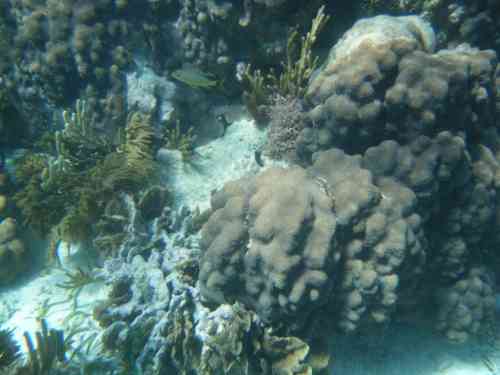
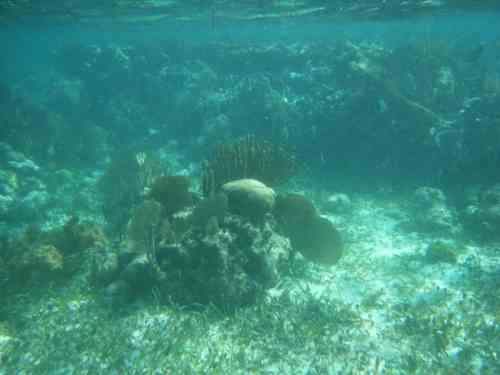
Here's a couple for kicks -
“Until justice rolls down like water and righteousness like a mighty stream.”
Next up --
do we get to visit some of those small, local, home-scale rare earth metals mines where the elements necessary for all that wonderful stuff are extracted from the Earth?
"Trump is doing everything he can to make America the highest-cost economy in the world, and he’s succeeded." -- Michael Hudson
Sure...
There's one leaving for Bolivia and another to Afghanistan. Pick your poison.
No lithium needed for passive design, nor solar thermal, nor solar ovens, nor methane production. Now PV panels take some rare earth and I understand the Si processing is pretty nasty too. But I would bet it ain't as nasty as Tar Sand extractions. Just as we can't live without death (of at least plants), we can't live without some resource extraction. The question is are we extracting with maximum or minimum impact.
Edit to add: hydro and geothermal also require none of the rare Earth. You had to read toward the end to find these other suggestions.
“Until justice rolls down like water and righteousness like a mighty stream.”
Good Sunday morning, Lookout ~~
Mr RA researched and installed solar and wind generation to our home about seven years ago. He's quite handy when he wants to learn something! We decided not to tie into the grid and bought a used fork-lift battery to store the extra power. It has worked, but the battery is getting old and not holding power as it used to. A Lithium battery would be ideal, but we need to wait for prices to come down. I expect that to happen in the near future. Also, we are intrigued with hydro power and how it can help us as we move forward. Lots of new things are coming to advance us. These are exciting times.
Weather has warmed up, we'll approach 90 today, and the trees are finally leafing out. It's my favorite time because I'm hungry for green scenery. We haven't had any rain since that big snow on April 10th. Hope to get rain at the end of this week - we'll see. The wind has been brutal, though. I'm growing weary of it, but at least it's warm.
Live in the present. Live in love.
Enjoy your day, everyone!
"The “jumpers” reminded us that one day we will all face only one choice and that is how we will die, not how we will live." Chris Hedges on 9/11
Batteries are the weak link
They have a life span...however there are alternatives out there but I suspect they are being suppressed. Things like Salt Water batteries for example.
Here's a couple of options...
https://www.solarelectricsupply.com/solar-batteries/aquion-energy-aspen-...
https://hotspotenergy.com/solar-batteries/
More on salt water batteries
https://www.electronicproducts.com/Power_Products/Batteries_and_Fuel_Cel...
Best of luck with your system. I've seen people use the electric motors in forklift in electric cars.
Thought of you with the closing quote. Have a great week!
“Until justice rolls down like water and righteousness like a mighty stream.”
I watched the whole film.
I cried through a lot of it and in particular at the end there is a very horrible scene of a mother orangutan and her baby in the Amazon I believe. It isn't for the faint of heart but I watched all the way through as I feel we should witness what is done in our name no matter how personally painful that is. I thought the film did a very good job and I can see why all the media hype is about it being too "negative" as they take on some pretty powerful, seemingly oh so virtuous "green" names. The resource extraction needed to transform the world to "renewables" is massive and destructive but hey, lets go ahead and mine what is left until it is all gone, surely our human innovative spirit will figure something out when that day comes, right? Can it really be finite? Surely humanity can overcome that...
The point of it, to me, is that there is no miracle cure. A Green New Deal sounds great until one looks into the details of just what that means. It is an attempt to keep the status quo as we know it today going and he makes a great point about the human fear of death and our inability to conceive that we too end. That analogy fits so well into the American mind set, just like those who say this whole covid thing will just go away and all will return to "normal" if we all just do our part. Please.
The thing that keeps running through my mind lately is something Chris Hedges pointed out about all those human made wonders of the world we all admire so - the pyramids, Versailles, the great wall of China, Mayan temples, those heads on Easter Island, etc. Most, if not all, of those great monuments to human ingenuity were built at the end of dying Empires in a last ditch attempt to retain their legitimacy with their ruled populace as the Empire was in its death throes. Many used up valuable resources in order to do just that, but that did not ensure their survival and probably helped speed up their demise. What will our great monuments be? I envision massive fields of tanks and planes rusting in the sun, skyscrapers eventually falling in on themselves, and yes, vast solar arrays in the now completely dead deserts along with wind turbines crumbling into the ground. But hey, maybe we'll drop a nuke and all of that will be wiped away as well.
The sad fact is we'll keep arguing about what really needs to be done, our standard of living MUST change, but neither our capitalist owners nor a populace who wants to believe in miracles will do what really needs to be done. We will excoriate the Michael Moore's and Jim Gibbs' for calling out our hubris and deny to the very end just how correct they were while telling ourselves the fix is just over the next rise in the road, just hang on and it'll all be OK as long as you believe it will. If it isn't OK, well, that'll be the fault of the naysayers for even bringing the subject up at first, later it will be because they didn't scream loud enough.
Only a fool lets someone else tell him who his enemy is. Assata Shakur
Thanks for your thoughtful reply
In the response on Rising, Moore makes an important statement (to me). He says something to the effect of, "they say we can't instantly change and turn on a dime, but we have with COVID". When we are afraid of death we can change fast. Well climate chaos is our death warrant. We are in the midst of the 6th great extinction.
We can change...and rapidly. We have evidence that world wide change can rapidly occur.
From my view, the idea that we can maintain our current lifestyle and consumption is very misleading. We must change or watch the planet and biosphere radically degrade.
I hope I provided evidence in this piece that we can also make use of alternate energy to promote our transition...but it isn't with centralized corporate systems.
Thanks again for your comment.
“Until justice rolls down like water and righteousness like a mighty stream.”
hola lo
Great ww. Thank you! I watched the video about Charles Bello and his redwood homestead. He said he had 400 acres. All cool. Need to find out exactly where it is.
Everyone should watch it.
Wonder what happened to his kids. He made his living selling Christmas trees that he stared the from leaf cuttings. Around 25 min in. 65K a year. Back in the day.
Great resource. Bookmarked.
Take good care and have a good one.
Stop Climate Change Silence - Start the Conversation
Hot Air Website, Twitter, Facebook
That is an opportunity for someone
We don't own land. It will persist long after we are gone. The line is, we borrow it from our children, but to my view it owns itself.
Living in that scene is a lifestyle choice, and we are all different. I know there are some young couples that would love to try it anyway.
Lots of easy projects in the WW...things like a solar oven, which I rarely use (but intend to use more). All the best and thanks for the visit.
EDIT to add: location appears to be Willits, CA.
http://savetrees.org/seeking_caretaker.aspx
Please send a detailed description of relevant skills and experience to Bello, PO Box 2079, Willits, CA 95490 or email cbello@savetrees.org.
“Until justice rolls down like water and righteousness like a mighty stream.”
Afternoon, Lookout
The hydro power images remind me of the ones in an old book I recently pulled out called Back to Basics by Reader's Digest. I bought a solar kit and inverter from Harbor Freight back in late Feb. It's basically plug and play, but I wanted to get a little more info on the ins/outs on a basic level, so I pulled out the book.
Have not assembled the system yet. I've been busy with my "babies". I started some heirloom seeds and constructed a spot for them that I call the Leaning Trellis of [road name]. Everything but the organic raised bed soil, the seeds and a very old roll of chicken wire was scavenged, repurposed. They're all in containers. Even the the name tags were repurposed styrofoam that held food at one time, and fallen twigs to tie them to until they got big enough to handle the wind.
Plant a garden, they said. It's a great stress reliever, they said. What they don't say is you'll be beside yourself when a squall line is moving through, or you'll become like a crackhead searching the floor for dropped crack, inspecting for predatory bugs. Still glad I did it! Hopefully, we'll have goodies in a few months.
I'm still not sure that when people say that a plant needs full sun if they have ever been to subtropical southeast Texas, and an hour and a half from the Gulf of Mexico. The cucumbers get wilty and limp when the sun is overhead, but perk back up after it is blocked by my shed on its way westward. Same with the pole beans. That's why I put the trellis behind the shed, to block the intense afternoon sun. I stuck the tomatoes, peppers and okra beside the shed and they seem to like it better there. They can handle the heat.
I know what you mean...
...Being a slave to the babies. We have a small mechanical room where the hot water heater resides. Years ago I built a shelf system with suspended fluorescent shop lights that can be raised and lowered. I also add a clip on incandescent light. The two together are pretty good providing the important wavelengths. However it gets hot in there during the day. So it is in and out, turn lights on and off, in a never ending pattern in tune with the weather. This year, since we're home all the time, our babies look better than ever. Have most plants already in the garden but still tending peppers and eggplants. In fact I have extras and have been offering them to friends but they all already have their going too. Seems more gardening this year than in a long time.
Then once you put them in the garden it is shade cloth or row covers on and off. It is always something. Then this year my issue is dysfunctional machinery, here when they are so important, but we've faced worse because we were in pretty good shape before the repairs became required. It is always something no matter what you do ain't it?
The functional doctors say some stress is good...
But usually they are talking about saunas and cold plunges.
Somehow, in some way I can't explain, growing things rewards us in many ways. Just makes me feel good. Hope you find it the same!
“Until justice rolls down like water and righteousness like a mighty stream.”
Good afternoon Lookout. Great WW. The link you provide to
built in solar ovens goes to an archival link for a specific project that is part of Solar Cookers International: http://solarcooking.org/. The sell some completed ovens, some kits of various types and plans for various types of DIY and simply provide tons of information. Their mission started out as spreading solar cooking and solar water sterilization to underdeveloped countries to reduce dependency on firewood collection.
We have 13 solar PV 13 panels, and went with a grid tie in for various reasons. The tie in has radically cut our PG&E costs, but left us dependent, because when the grid goes down, or when they shut it down, our system is also taken down. Theoretically we can wet it up so we would still have power during sunlight times, but there was one extra subsystem we didn't get (I thought it was just the outlet sub system, but it is more). Now it is a toss up to track that down and order it, or to simply wait for storage capacities to come down. One problem with the latter is siting.
We also have a huge panel on our travel trailer that we could arguably hook into when we are at home, which is something else I need to research. Instead, we simply use a small honda generator a couple of hours a day when the grid is down.
Thanks for covering this whole topic and for that wealth of data and links.
be well and have a good one.
That, in its essence, is fascism--ownership of government by an individual, by a group, or by any other controlling private power. -- Franklin D. Roosevelt --
I'm up grading my solar oven this summer
...after reminding myself when I put this together.
I want to add a screen collector. I got some extra black AL screening.
https://builditsolar.com/Experimental/PopCanVsScreen/PopCanVsScreen.htm
Our house is under trees. It is AL and cooling is more of an issue than heating. So we must treat our oven like an outdoor BBQ or grill. In other words food out, cook out, food in. Solar cooking is slow cooking so it isn't too big a problem just requires forethought...
Thanks for the visit and have a good Sunday!
“Until justice rolls down like water and righteousness like a mighty stream.”